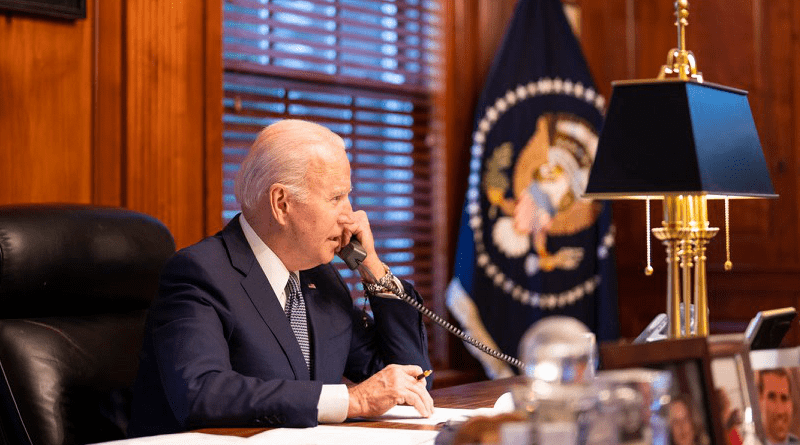Biden Administration’s Flawed Stance On Russia – OpEd
As quoted from the longtime Democratic Party politico Leon Panetta:
“But I think this comes down still to a military issue because I think what will persuade Putin is whether or not, if he engages in war, he could get a black eye. And one thing bullies don’t like to do is to get a black eye,” Panetta explained. “And I think that’s where our strongest leverage is.”
When it comes Russia and some other topics, projection is something American political elites like Panetta typically exhibit. While personally preferring a civil approach, I’m reminded of my view (at the 17 minute mark) that referring to Vladimir Putin as a bully, is on par with calling Joe Biden the same. Likewise with saying Volodymyr Zelensky is a twerp and the former president of Estonia (Toomas Hendrik Ilves) is a bigoted scumbag. (Stressing my preference against making these type of characterizations and simultaneous objection to the hypocrisy some exhibit on what is and isn’t ad hominem.)
Recall how Biden treated some Americans during the 2016 US presidential campaign. Specifically, his treatment of a senior citizen and a young woman in verbally confrontational instances. Note Biden confidently bragging about how he threatened to cut off aid from Ukraine, if it didn’t fire the attorney investigating the Ukrainian firm Biden’s son was working for.
Biden has supported US wars abroad. His Russia-Ukraine takes bring to mind that bullies are inclined to exaggerate a given circumstance to seek confrontation. Such people are known for making insulting threats beforehand, in an effort which serves to further provoke a confrontational situation. With inaccurate innuendo, bullies are prone to attacking those they disagree with.
This last point touches on Biden calling Putin a killer, when prodded by ABC’s George Stephanopoulos. In a not too distant CSPAN aired discussion, former CIA analyst Joseph Weisberg, delves into the projection that some American elites make towards their Russian counterparts. (Weisberg is the creator of the FX TV aired series “The Americans“.
Hyping a Russia-Kiev regime conflict draws some attention away from Biden’s low poll numbers, having to do with US domestic issues. Increased Russia-Kiev regime tension benefits the US military industrial complex, as well as the flat out anti-Russian advocates, who’ve influenced the US body politic.
One of numerous examples is New Jersey’s longtime time Democratic Senator Robert Menendez. He spoke of Russians coming home in body bags in a Russia-Kiev regime war. On Fox News, Victor Davis Hanson observed an obscene approach in the manner of Menendez’s remark.
Menendez has been honored by the Ukrainian Congress Committee of America, known for strident anti-Russian activism. In the unfortunate event of a Russia-Kiev regime war, Menendez should be aware it’ll not be Russia needing the most body bags.
In stark contrast to Panetta and a good portion of the Western political establishment, German Vice Admiral Kai-Achim Schönbach felt compelled to resign after he said that Putin should be respected, Crimea will remain part of Russia and there should be a greater critical concentration on China.
Some might say it’s not for an armed forces officer to express their opinion on such issues. In the US, Schönbach’s peer, Mark Milley, has been noticeably critical of Russia, while exhibiting a comparatively gentler prose towards China. Free expression has apparent limits.
Schönbach’s comment runs counter to a discussion on Fareed Zakaria’s CNN aired GPS show of January 30. In this segment, The New York Times’ Katrin Bennhold appears to favor Germany having a harder line towards Russia. The same is more evident of Ukraine’s ambassador to Germany Andrey Melnyk.
Within US establishment circles, Fox News host Tucker Carlson, continues to get flack for being critical of the overly confrontational stance towards Russia and softer position accorded to the Kiev regime. Ukrainian-American activist Alexandra Chalupa tweeted that Carlson should be prosecuted for not being a registered foreign agent.
Coming from Chalupa, this is pretty rich, seeing her involvement with some Ukrainian government connected folks for the purpose of doing “opposition research” (finding dirt) on Donald Trump during the 2016 US presidential campaign. Is Chaulpa a registered foreign agent?
Carlson’s Russia-Ukraine observation refers to the Kiev regime not being threatened with sanctions for its military buildup near the Donbass rebel area, while evading the UN approved Minsk Protocol, advocating a negotiated autonomy settlement between the two conflicting sides in the former Ukrainian SSR. Similarly, no sanctions were put in place against those who violated the internationally brokered power sharing arrangement between Ukraine’s democratically elected president Viktor Yanukovych and his main opposition.
Yanukovych’s overthrow put in place a non-democratically selected regime, which was top heavy with anti-Russian advocates. In turn, the more pro-Russian elements in the former Ukrainian SSR (notably in Crimea and Donbass) expressed their opposition to the coup.
The increased Russian troop buildup in European Russia is in line with the existential threat NATO poses to that country. In addition to having been militarily active in some non-NATO countries, NATO exhibits an anti-Russian bias.
Prior to the aforementioned Russian military buildup, the Russian government stated its opposition to NATO expanding near Russia for a period running over twenty years. Russian Foreign Minister Sergey Lavrov has referenced the 1999 Istanbul and 2010 Astana declarations, stipulating that an expanded military bloc shouldn’t threaten another country.
When noting this particular, Lavrov said his US counterpart Antony Blinken gave a shrugged shoulders reply.
Michael Averko is a New York based independent foreign policy analyst and media critic.

